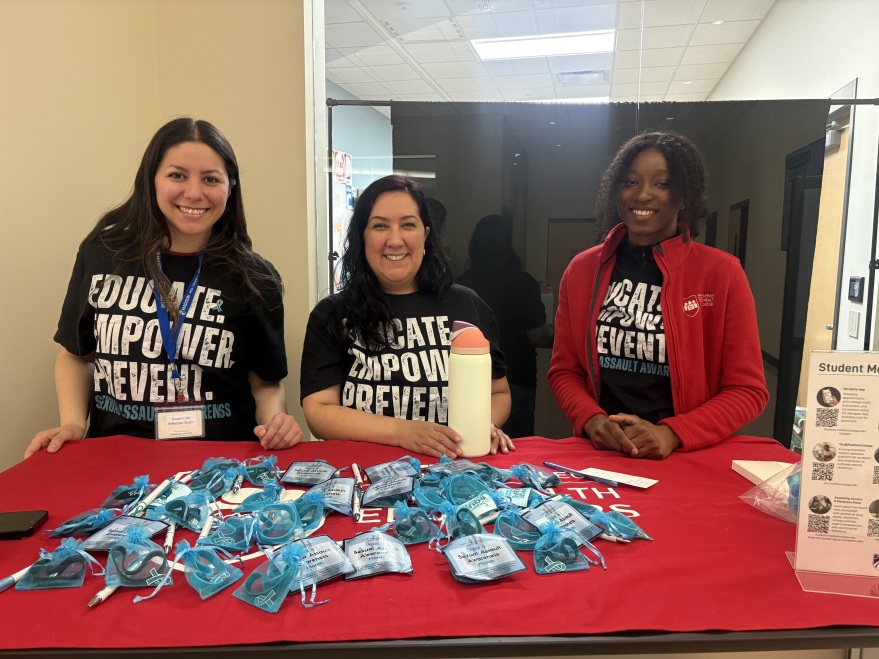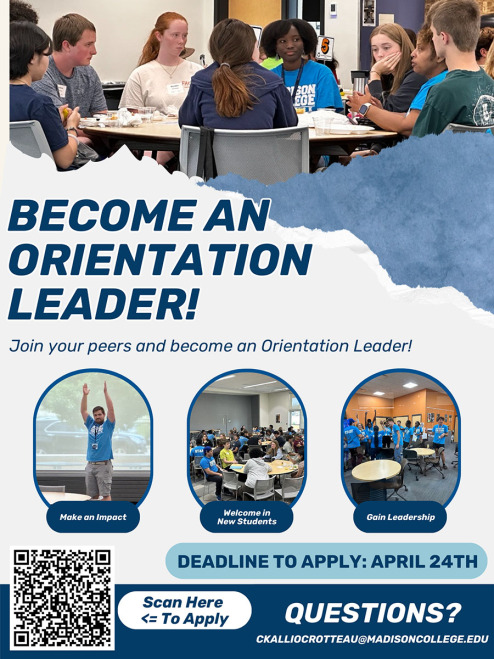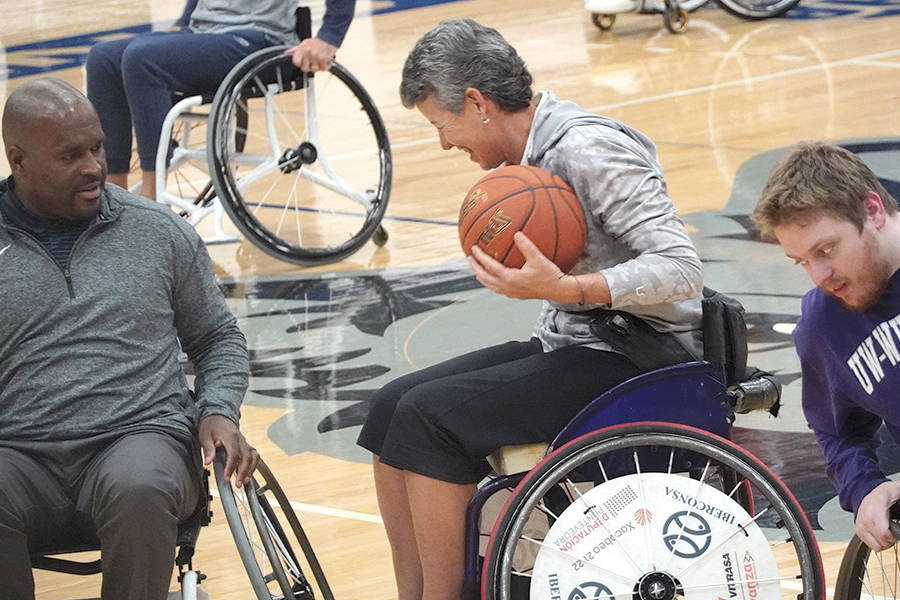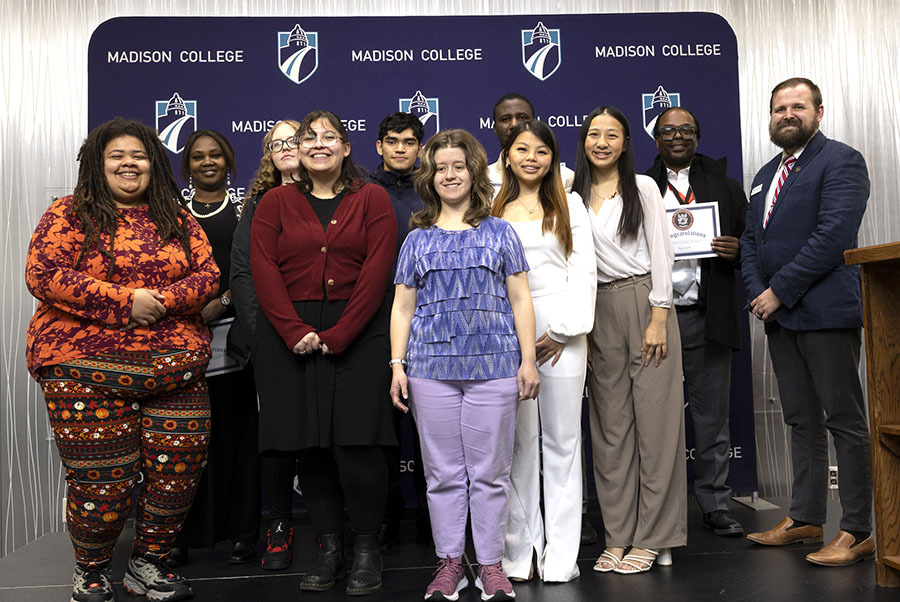Disability Resource Services champions equitable access
Members of the Madison College Athletic Department compete against the UW-Whitewater Wheelchair basketball team.
November 9, 2022
Madison College Disability Resource Services encouraged students of all abilities to participate in grassroots style events during National Disability Employment Awareness Month (NDEAM).
Madison College Disability Resource Services (DRS) planned a diverse set of offerings which included both virtual and in person opportunities. The agenda highlighted award-winning films, historical lectures and Olympic athletes.
The message of these events is clear: disabled workers are everywhere, in every industry, and the disabled workforce contribution is improving the human experience.
Scott Ritter, Director of Disability Resources & Testing Assessment Services said, “Championing equitable access and fighting anti-ableism serve as the foundation of the great work we do.”
The month-long program of events focused on intersectionality and embracing identity. “We feel the events have helped the college and community better understand how the identity of disability is experienced across the myriad of identities we humbly serve at the college,” Ritter said.
Ritter explained the DRS commitment as one of privilege and shared narrative.
“The stories students bring to us, and the co-authorship we experience with them, as they pursue their dreams, is the greatest privilege a professional could ever ask for,” he said.
The DRS illuminates community, equity and pride by establishing access and pathways of communication.
NDEAM has national origins, stemming from the Americans with Disability Act (ADA) signed in 1990, Section 504 of the Rehabilitation Act of 1973, and National Employ the Physically Handicapped Week enacted into law in 1945.
The October 2022 events at Madison College looked at the present, past and future of disability rights. Celebrating the collaborative efforts of Americans with disabilities and their allies.
The DRS events included a presentation, “504 and Beyond: Disability Politics and the Black Panther Party” by Dr. Sami Schalk, associate professor in the Department of Gender & Women’s Studies at University of Wisconsin. The presentation discussed the Black Panther’s involvement in historic Section 504 sit-in (26 days) at San Francisco Federal building in 1977.
Section 504 barred discrimination against people with disabilities in all buildings and facilities receiving federal funds, including colleges and universities. The talk highlighted the significance of marginalized people working together to create and establish equity for each other and for all Americans.
“Section 504 was revolutionary, far-reaching civil rights legislation,” Ritter said. However, it was the sit-in collaboration which forced politicians to put the law into action.
Approximately 30 people attended the event virtually or in person and learned about disability rights as an integral part of a larger liberation movement.
Dr. Schalk’s presentation highlighted the Black experience, which was an articulate guide in bringing equity to disabled Americans. The Madison College DRS also highlighted the positive impact disabled workers are currently having across the nation in the screenings of award-winning films “Deej” and “Normal Isn’t Real.”
The two documentaries shine light on the “whole person” – all people regardless of ability, rather than evoking a sense of pity or focusing on deficits, said Ritter. The documentary interviews narrate the neurodivergent human experience, rather than expert analysis of ADHD, autism or learning disability.
“Normal Isn’t Real” follows neuro-diverse people through successes and challenges. “It is a powerful framework for learning and advocacy and debunks the misnomer of normal, said Ritter.
“Deej,” said Ritter, follows the journey of a person with autism. This person is a poet, a son, a boyfriend, a high school graduate, a college student, a scholar and a movie star. Deej, a person of great substance and many identities, is also nonverbal, in his own words.
“Deej” is an authentic story of teamwork, trust, creativity and above all unconditional advocacy and support. The nature of which drove Deej’s family and himself to amazing heights.
“It is remarkable and should serve as a compass for action and a reminder of what is truly possible,” Ritter said.
The October celebration included the annual wheelchair basketball fun, “Cornerstones for Success.” The annual event showcases the University of Wisconsin Whitewater Warhawks. The national champion Warhawks dazzled with smooth fast breaks, silky shots and a message to inspire.
Ritter said the event was especially powerful because it brings people from across the college together, in fun way, to listen to a vital message about leadership.
UW-Whitewater Warhawks Wheelchair basketball team has been a dominant presence in Olympic and national level competition. Their tradition of leadership and teamwork is a prestigious example of what can be accomplished when disability barriers are dismantled.
































